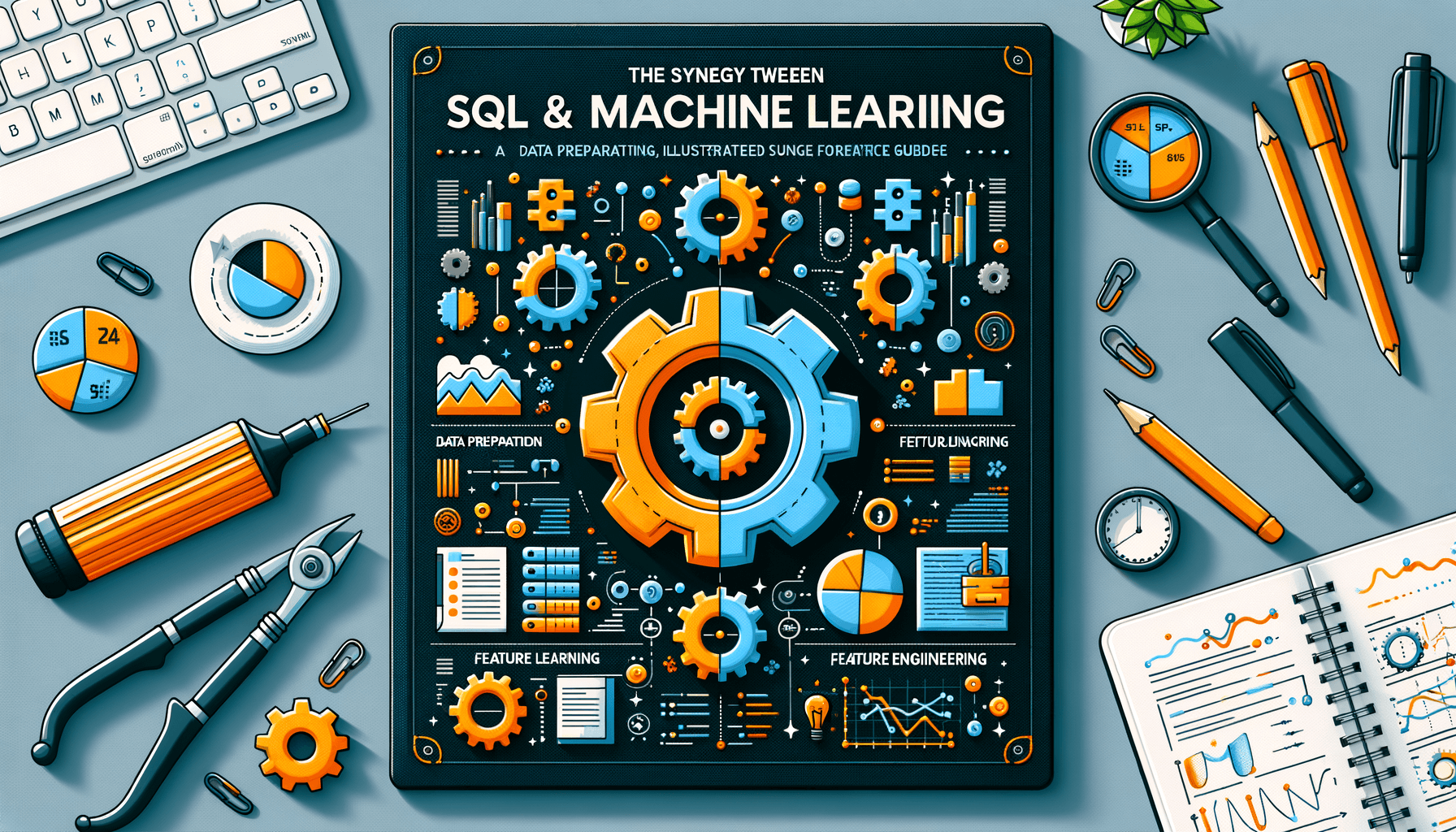A big variety of articles and resources

Why should I learn the SQL language?
 Sia Author and Instructor
Learn SQL
Sia Author and Instructor
Learn SQL
12 minute read
Learning SQL (Structured Query Language) is a smart move for anyone interested in working with data. SQL helps you manage and use data in many ways, from storing and retrieving information to keeping it safe and accurate. Whether you're looking to start a career in tech, improve your data analysis skills, or just understand how data works, SQL is a valuable tool to learn.
Key Takeaways
- SQL is essential for managing and using data effectively.
- Knowing SQL opens up many job opportunities in different fields.
- SQL helps you perform complex data analysis and create reports.
- In web development, SQL is used for managing databases and user information.
- There are many resources available to help you learn SQL, like online courses and books.
The Importance of Data Management
Understanding Data Storage
In today's digital age, data is everywhere. We need to know how to store it properly. Good data storage means we can find and use our data easily. It also helps keep our information safe from loss or damage.
Efficient Data Retrieval
When we need information, we want it fast. Efficient data retrieval makes this possible. By organizing our data well, we can quickly get the details we need. This saves time and helps us make better decisions.
Data Integrity and Security
Keeping our data accurate and safe is very important. Data integrity means our information is correct and reliable. Security ensures that only the right people can access it. Together, they protect our data from errors and threats.
Managing data well is key to using it effectively. It helps us store, find, and protect our information, making our work easier and more reliable.
SQL as a Standardized Language
History and Evolution of SQL
SQL has a rich history that dates back to the 1970s. It was developed to manage and manipulate data stored in relational databases. Over the years, SQL has evolved significantly, incorporating new features and capabilities to meet the growing demands of data management.
SQL Standards and Compliance
One of the key strengths of SQL is its standardization. The American National Standards Institute (ANSI) and the International Organization for Standardization (ISO) have established standards for SQL, ensuring consistency and compatibility across different database systems. This standardization makes it easier for developers to work with various databases without needing to learn a new language for each one.
Cross-Platform Compatibility
SQL's standardized nature also means it is highly compatible across different platforms. Whether you're working with MySQL, PostgreSQL, or Microsoft SQL Server, you can use the same SQL commands to interact with the database. This cross-platform compatibility is a significant advantage for developers and businesses alike, as it simplifies the process of managing and querying data across different systems.
Understanding the standardized nature of SQL can help us appreciate its versatility and widespread adoption in the tech industry.
Career Opportunities with SQL
Demand in Various Industries
SQL skills are in high demand across many industries. From finance to healthcare, companies need professionals who can manage and analyze data. Knowing SQL can open doors to many job opportunities. Whether it's a small startup or a large corporation, the need for data management is universal.
Roles Requiring SQL Skills
There are many roles that require SQL skills. Some of these include Database Administrator, Data Analyst, and Software Developer. Each of these roles involves working with data in different ways. For example, a Database Administrator might focus on maintaining databases, while a Data Analyst might use SQL to extract insights from data.
Salary Expectations
Salaries for jobs requiring SQL skills can be quite competitive. According to recent data, the average salary for a Database Administrator is around $75,000 per year. Data Analysts can expect to earn around $65,000 per year, while Software Developers with SQL skills can earn upwards of $85,000 per year.
Learning SQL can be a great way to boost your career prospects and increase your earning potential. With the right skills and experience, you can find a rewarding job in a variety of industries.
SQL for Data Analysis
Performing Complex Queries
When we need to dig deep into our data, SQL lets us perform complex queries that can pull out exactly what we need. This is especially useful when dealing with large datasets where manual analysis would be impossible. SQL's ability to handle complex queries makes it an essential tool for any data analyst.
Data Aggregation Techniques
Data aggregation is all about summarizing data to make it more useful. With SQL, we can use functions like COUNT, SUM, and AVG to quickly get insights from our data. These techniques are crucial for efficient data preparation and improved data quality.
Integration with Analytical Tools
SQL doesn't work alone. It integrates seamlessly with many analytical tools, making it easier to analyze data and generate reports. This integration is key for advanced analytical skills and project readiness. Whether we're using SQL with Excel, Tableau, or other tools, it helps us tackle real-world problems effectively.
SQL's versatility in data analysis makes it a must-learn for anyone looking to work with data. From performing complex queries to integrating with powerful analytical tools, SQL is the backbone of data analysis.
SQL in Web Development
Backend Database Management
In web development, managing the backend database is crucial. We use SQL to store, retrieve, and manipulate data efficiently. This ensures that our applications run smoothly and can handle user requests effectively. Proper database management is essential for maintaining the performance and reliability of web applications.
Dynamic Content Generation
SQL plays a vital role in generating dynamic content for websites. By using SQL queries, we can fetch data from the database and display it on web pages in real-time. This allows us to create interactive and personalized user experiences. For example, an e-commerce site can show products based on user preferences and browsing history.
User Authentication and Authorization
User authentication and authorization are critical components of web security. With SQL, we can manage user credentials and permissions securely. This involves storing user information in the database and verifying it during login attempts. Additionally, we can control access to different parts of the application based on user roles and permissions.
From zero to PostgreSQL Junior DBA: Complete Database Administration Course. Gain practical SQL skills with hands-on projects, personalized support, and industry insights. Instructor with 25+ years experience. Course requires effort for success.
Learning SQL for Business Intelligence
Building Reports and Dashboards
In the world of business intelligence, creating reports and dashboards is crucial. These tools help us visualize data and make informed decisions. Mastering SQL allows us to pull the right data and present it in a way that is easy to understand. We can use SQL to filter, sort, and group data, making our reports more insightful.
Data Warehousing Concepts
Understanding data warehousing is essential for any business intelligence professional. A data warehouse is a central repository of data from different sources. By learning SQL, we can efficiently manage and query this data. This skill is vital for combining data from various systems and ensuring it is accurate and up-to-date.
Real-Time Data Processing
Real-time data processing is becoming more important in today's fast-paced world. With SQL, we can handle real-time data streams and make quick decisions based on the latest information. This ability is particularly useful in industries like finance and e-commerce, where timely data is critical.
By mastering SQL, we can enhance our skills with advanced functions, data handling, and analytical techniques, making us more effective in our roles as BI professionals.
SQL and Big Data Technologies
Handling Large Datasets
When working with large datasets, SQL proves to be a powerful tool. It allows us to manage and query vast amounts of data efficiently. SQL's ability to handle large datasets makes it indispensable in the era of big data. We can perform complex queries and retrieve meaningful insights without compromising performance.
Integration with Big Data Tools
SQL integrates seamlessly with various big data tools like Hadoop and Spark. This integration enables us to leverage the strengths of both SQL and big data technologies. For instance, we can use SQL to query data stored in Hadoop, combining the scalability of Hadoop with the simplicity of SQL.
Scalability and Performance
Scalability is a critical factor when dealing with big data. SQL databases are designed to scale horizontally, allowing us to add more servers to handle increased loads. This ensures that our applications remain responsive even as the amount of data grows. Additionally, SQL databases offer performance optimization features, such as indexing and partitioning, to enhance query speed and efficiency.
In the world of big data, SQL remains a vital skill. Its ability to handle large datasets, integrate with big data tools, and scale efficiently makes it a cornerstone of modern data management.
Educational Resources for Learning SQL
Online Courses and Tutorials
For those starting out, online courses are a great way to learn SQL. One popular option is the Introduction to SQL course, which offers hands-on SQL training with industry insights. The instructor, Eric Vanier, specializes in database performance and optimization, empowering teams with valuable skills.
Books and Publications
Books can be a solid resource for learning SQL. They often provide in-depth explanations and examples. Some recommended titles include "SQL for Dummies" and "Learning SQL" by Alan Beaulieu. These books cover everything from basic queries to advanced topics.
Community and Support Forums
Joining a community or support forum can be very helpful. These platforms allow you to ask questions, share knowledge, and learn from others' experiences. Websites like Stack Overflow and Reddit have active SQL communities where you can find answers to your questions and connect with other learners.
Learning SQL can open many doors in your career. With the right resources, you can master this essential skill and apply it in various fields.
Practical Applications of SQL
Automating Routine Tasks
We can use SQL to automate many of our daily tasks. For example, we can schedule reports to run at specific times. This saves us from doing the same work over and over again. Automating these tasks helps us focus on more important things.
Customizing Data Views
With SQL, we can create custom views of our data. This means we can see only the information we need. We can also combine data from different tables. This makes it easier to understand and use.
Developing Data-Driven Applications
SQL is key for building applications that rely on data. We can use it to store and manage user information. This is important for apps that need to keep track of users and their actions. Using SQL in this way makes our applications more powerful and useful.
SQL for Database Administration
Database Design Principles
When we design a database, we need to think about how the data will be stored and accessed. Good design helps us avoid problems later. We should plan the tables and relationships carefully. This makes it easier to get the data we need quickly.
Backup and Recovery Procedures
Backing up our data is very important. If something goes wrong, we need a way to get our data back. We should have a plan for regular backups. Also, we need to know how to recover the data if we lose it. This keeps our information safe.
Performance Tuning and Optimization
To make our database run fast, we need to tune it. This means we look for ways to make it work better. We can use tools to help us find slow parts and fix them. Optimizing our database helps it handle more users and data without slowing down.
In our mini course: SQL Query Expansion, we cover advanced functions like UNION, MIN, and MAX. These skills are key for database management and performance tuning.
SQL for Database Administration is a crucial skill for anyone looking to manage and optimize databases effectively. Our courses are designed to help you master SQL from the ground up. Whether you're a beginner or looking to refine your skills, we have the perfect course for you. Visit our website to explore our course catalog and start your journey towards becoming a SQL expert today!
Conclusion
Learning SQL is a valuable skill that opens up many opportunities. It helps you understand and manage data, which is important in many jobs today. SQL is not too hard to learn, and there are many resources available to help you. By learning SQL, you can improve your problem-solving skills and make better decisions based on data. Whether you want to work in tech, business, or any other field, knowing SQL can give you an edge. So, take the time to learn SQL and see how it can benefit you in your studies and future career.
Frequently Asked Questions
What is SQL?
SQL stands for Structured Query Language. It's used to manage and manipulate databases.
Why is data management important?
Good data management helps keep information organized, easy to access, and safe from errors or loss.
How does SQL help in data retrieval?
SQL lets you quickly find and pull out specific information from a database using simple commands.
What are some careers that require SQL skills?
Jobs like data analyst, database administrator, and software developer often need SQL knowledge.
Can learning SQL boost my salary?
Yes, knowing SQL can make you eligible for higher-paying jobs in many fields.
Is SQL useful for web development?
Absolutely, SQL is used to manage backend databases, create dynamic web content, and handle user authentication.
Where can I learn SQL?
You can learn SQL through online courses, books, and community forums.
What are some practical uses of SQL?
SQL can automate routine tasks, customize data views, and help develop data-driven applications.
Related Articles

Harnessing SQL for Machine Learning: A Comprehensive Guide
11 minute read

How Fast Can You Learn SQL? Tips for Rapid Mastery
8 minute read

Is it worth learning SQL in 2021-2022?
14 minute read




